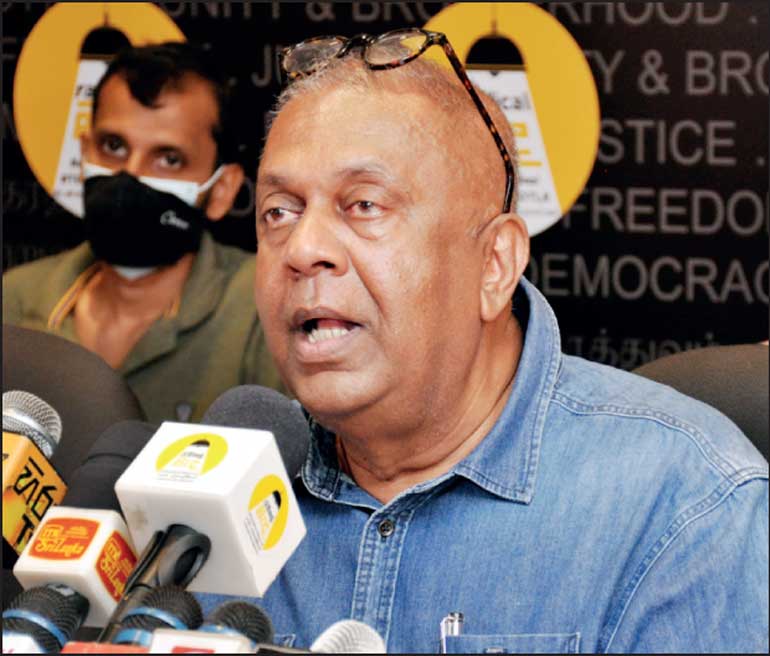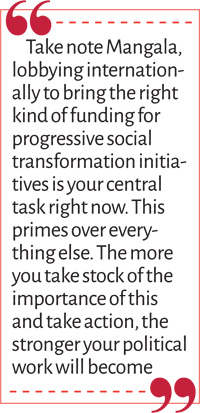Tuesday Feb 17, 2026
Tuesday Feb 17, 2026
Wednesday, 28 July 2021 00:00 - - {{hitsCtrl.values.hits}}

Mangala Samaraweera
Dear Mangala,
Your efforts at building a political discourse based on inclusivity, rights and a sense of cosmopolitanism are, indeed, very commendable.
However, your messaging appears to be truncated, incoherent and parsimonious at best. Let alone the masses in Lankan society who do not have access to progressive political discourses discussed in the English language, your messaging seems to fail to reach a considerable segment of the English-speaking, educated, internationally-exposed audience as well.
The basics
Sri Lanka’s polity today can be broadly classified into the following categories:
1. The neoconservative current: represented by the following:
a. The SLPP
b. The SLFP
c. SJB [as opposed to a popular understanding, the SJB does not represent a neoliberal current in Lankan politics. The Premadasa leadership and its functional dynamics have clearly demonstrated that the SJB is simply nothing but ‘SLPP-lite’/
d. The UNP: Under Ranil Wickremesinghe, the UNP became a member of the International Democratic Union. The UNP under Mr. Wickremesinghe is therefore Sri Lanka’s quintessential Conservative Party. Wickremesinghe reinforced the party’s links to British Conservatives, and has been a frequent presence at British Tory Party conferences.
e. Some elements in the JVP [whose petit-bourgeois discourse of the supposed ‘left’ has nothing left leaning about it, but a load of conservative inanities of yesteryear [the {neo} conservatisms of the JVP cannot be discussed here, and would require a separate article.
2. The neoliberal ‘residue’
This is the segment in Sri Lankan politics that you, Mangala, need to read, decipher and understand, if you are serious about building a political project based on inclusivity, human rights, the rule of law, and a strong sense of cosmopolitanism.
I call this element ‘residue’, because it is precisely that – individuals who are stuck in their respective political affiliations, who have no options to rise to positions of significant leadership in their respective political circles, and who are in no position to give tangible expression to their liberal views and approaches.
These are people who strongly stand for the human rights of all Sri Lankans. They are also supportive of transforming the polity on the path to 50:50 parity. They are supportive of the rights of minorities. They support an intelligent foreign policy that is focused on the interests of the Sri Lankan people and state, and are critical of, and disgusted by, the Rajapaksa brothers’ headless-chicken attitude to foreign affairs.
The most important point is that people who belong to this neoliberal residue exist in the following parties: SJB, JVP, NPP, and to a lesser extent, in the UNP. Some of the best educated personalities in the SJB belong to this category. The current leadership of the JVP also belongs to this category. Neoliberal politicians, in my reading, do not exist in the SLPP. If that were the case, such politicians would have by now left the SLPP and SLFP.
This neoliberal residue obviously includes you, Mangala, and everyone who supports your ongoing initiatives, including former President Kumaratunga.
If the above reading were to be taken stock of when looking at your political project, here’s your key, Mangala, to success: bringing the neoliberal residue in present-day Lankan politics under your wings. How to go about this, you know better than me, being the seasoned politico you are.
 Developing a Sri Lankan brand of liberalism
Developing a Sri Lankan brand of liberalism
Do not forget the backlash [whether you publicly admit it or not] that you faced from within SJB ranks closer to the last General Election. Your admission of the truth that Lanka is not exclusively Sinhala-Buddhist, and your preparedness to openly admit your truth as a non-heteronormative man, were anathema to many in SJB circles.
Let’s also recall that the current JVP leadership’s [and several other leading JVP personalities’] resolve to build a rights-based left-of-centre political discourse, involving, especially, LGBT+ rights, backfired big time. As some LGBT+ supporters of the NPP have themselves admitted, the JVP/NPP’s open-minded stance on LGBT+ rights during the 2019 presidential campaign was quite unpopular among the JVP’s vote base. At the 2020 General Election, the guideline was to ‘keep it low’ when it comes to issues such as LGBT+ rights [even that wouldn’t work, as the seat count reduced from 6 to 3].
In such a context, how can you bring the neoliberal residue together, making a liberal brand of politics a strong current in Lankan politics?
There is no straightforward answer to this question. However, what is crystal-clear is that you need to start with a well-funded initiative [or set of initiatives] intended at transforming the public mindset. There is a need to ‘normalise’ and ‘mainstream’ a discourse on inclusive gender justice in present-day Sri Lanka.
There is a need to bring the public debate to a level that LGBT+ human rights are understood as a core element of human rights of all citizens, and that their provision is non-negotiable. There is a need to bring the public debate to a place where a growing majority of the population as a whole supports an approach to ethno-national politics that focus on self-determination, generously devolved governance, and the strengthening of conflict transformation work in our diverse communities.
The crucial ground work?
None of this can be done by focusing only on the next national-level election, or the election after that. To do this work, there is a need for a series of funded projects, run by the right people, reaching out to the right communities, deploying all forms of new media, and ensuring that the message reaches to all nooks and crannies of Lankan society in intelligible Sinhala and Tamil. To make this all happen, you are in luck Mangala, because the Biden Administration is now in office, and your friend Dr. Power heads USAID.
Take note Mangala, lobbying internationally to bring the right kind of funding for progressive social transformation initiatives is your central task right now. This primes over everything else. The more you take stock of the importance of this and take action, the stronger your political work will become.
Transformative work of this nature, organically developed by citizens committed to rights, equality and justice, needs to take place in unprecedented proportions. The younger generation, and not the geriatric dinosaurs of the ’90s liberal peacebuilding days who are friends with you, should be given the lead.
This work needs to emphasise that public safety and security, breaking glass ceilings, fighting against child labour in Malayaga Thamil communities, the rights of LGBT+ citizens, the rights of ethno-national minorities, the full implementation of the national language policy, anticorruption and good governance work, are all inextricably interlinked and interconnected [in other words, old drivel such as ‘let’s take things incrementally, let’s not mention this or that issue too much, let’s be cautious, etc., no longer carry any traction, and deserve to be flushed down with no second thoughts].
It is on top of such work that your political skills need to be deployed, to bring the ‘neoliberal residue’ in Sri Lankan politics under one single umbrella. It should be a place with no neocons, no chauvinists, no Rajapaksas, no Premadasas, and definitely no Wickremesinghes. If you were to include the latter in your politics, to say that you’ll be shooting yourself in the foot, Mangala, is a mammoth euphemism.
If you were to be successful, you better launch Sri Lanka’s first ever 50:50 parity campaign with no delay. This means that every single nomination list, electoral list, national list, will need 50:50 parity. Get the right people on board to support you with this – as ‘intersectionality’ is the keyword here.
If your 50:50 parity only includes women who are relatives of male politicians, or cisgender able-bodied women who are mostly Sinhala, then that’s the recipe to lose the plot. The right way, is to make sure that the 50% of women in every list includes a substantial diversity of women from all ethno-national, linguistic, social class and other diverse backgrounds, including LBTQ women.
Representation matters!
You, Mangala, despite what transpires as a genuine commitment to change and your experience in politics, are a man. You are a Sinhala, Buddhist, cisgender man in his late 60s. This means that if you were to be successful in this venture, you need dynamic brand ambassadors, composed of a younger generation of Lankans of substance, with a fine gender balance, and a focus on what I would call ‘intersectional inclusion’ [in other words, to explain that term in its ABC, don’t ever do a campaign without at least one Tamil woman, a Muslim woman, an LBTQ woman, a disabled woman. Such an approach will keep you right, and help demonstrate how different your new political project is from all others. And if there are several women at a press conference or any other event and if a majority of them are Sinhala, that’s simply not on].
You have videos on social media where younger Lankans ask questions and you respond. The right approach, Mangala, should be the other way around. Use your power and influence to create an unprecedented platform for young leaders and subject-matter experts to take the floor and respond to your questions and questions from others. Give ‘front-and-centre’ space to bold thinkers of the younger generation.
All of the above is not excessive, not ‘too much’, and absolutely essential, if you were to be successful in making a difference with your new political project. If you do not pursue a path similar to that outlined above, you risk continuing in the recesses of the neoliberal residue, and if you do secure power through a 2015-like machination, you will end up as a Sirisena/Wickremsinghe-type shameless loser.
Take care, Mangala. Keep up the good work, and stay safe!
(The writer is your ‘sister outsider’ and can be reached at [email protected])